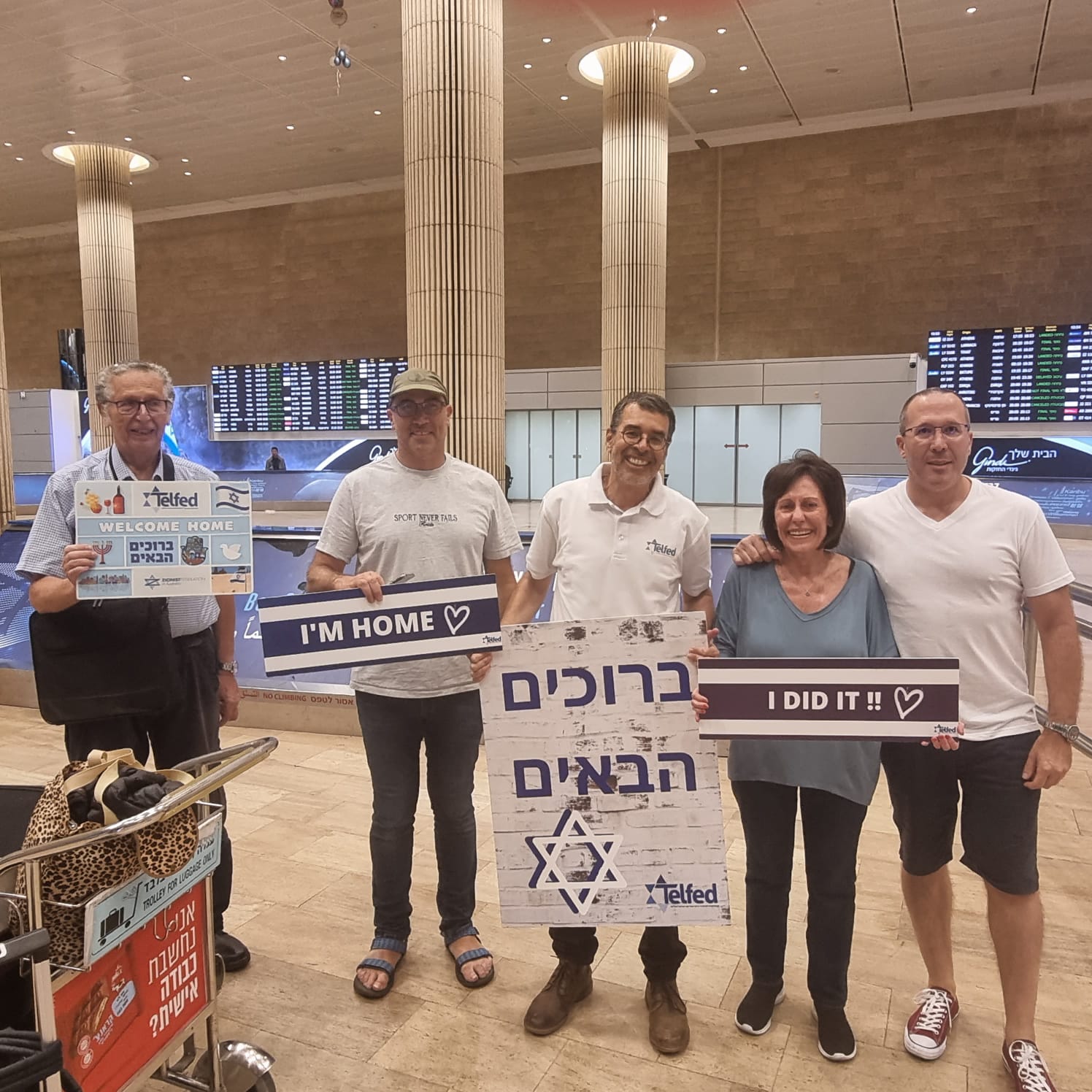
Israel

Making aliya into a war
Soon after touching down at Ben Gurion Airport in Israel on 15 October, 73-year-old South African olah Andrea Goldblatt experienced a traumatic moment when a siren sounded, warning of a nearby missile attack.
“I had to run from the immigration office to the stairwell, and take shelter. I stood there until the siren went off and it was all clear,” says the Cape Town-born Goldblatt, who had lived in South Africa her whole life until making aliya this week.
Goldblatt made aliya because she has no family in South Africa and her daughter, son-in-law, and two grandchildren live in Israel. “I’ve been deciding to do it for a while,” she says. “I finally realised that I do need to go sooner rather than later because I’m going to be 74 this month. What precipitated the decision to make aliya now was that I sold my house in Club Terrace [in Linksfield, Johannesburg]. If I hadn’t sold it, I would never have come now. You can’t leave a property and go.”
She felt sad getting on the plane, knowing she was heading to a country at war. “It wasn’t the elation that I should have felt. I was anxious about rockets possibly hitting the plane.”
Telfed Chief Executive Dorron Kline, says Goldblatt and another South African olah, who didn’t want to be interviewed or named, are the only South Africans who have made aliya since the war in Israel started. Goldblatt’s son-in-law and his friend welcomed her at the airport’s arrival hall alongside Kline and a volunteer, Paul Weinberg. The latter two had travelled to the airport from Ra’anana with fear of rockets overhead. They presented Goldblatt with a welcome pack, which included essential first-step information.
The other South African olah had stepped into the arrival hall of Ben Gurion Airport when the siren sounded. “We lay on the airport floor as I explained the absorption process to her,” Kline says. “A few minutes after the Iron Dome intercepted the missile, we stood up, took a welcome photograph, and continued our conversation.”
Kline says Goldblatt was thankful that Telfed staff and volunteers came to greet her at the airport. “She was the first olah to receive an Israeli ID book at the airport since the COVID-19 pandemic. The absorption ministry is aware government offices aren’t fully functioning at this time, so it saved her a visit to the Ministry of Interior and presented her with an ID book at the airport. Both new olim are coming to stay with their families, so the excitement of family reunification is greater than worry or fear.”
Goldblatt says it was incredible that a Telfed representative named Abraham – who ironically also met her children when they made aliya seven years ago – welcomed her upon her arrival at the airport. “I didn’t know what to do or where to go, but he whisked me through, took me straight to the office and did everything. At the office, I was given my te’udat oleh (immigrant’s certificate) and signed up for medical aid. I received my Israeli ID, a generous amount of money, and an Israeli SIM card. I was offered a taxi voucher to get home, but my son-in-law and a friend were coming to the airport.”
Goldblatt says everybody in Israel has been incredibly welcoming. Her daughter, son-in-law, grandson, and granddaughter were “terribly excited” about her joining them in Ra’anana. “They knew already a few months ago. They’ve been asking me to come. I wasn’t ready, but I’ve been to Israel twice every year since they made aliya.”
She feels relieved to be settled in Israel. “Now that I’m with them, it’s better than phoning every day to see what’s happening. I feel more relaxed. I don’t think it’s as bad in Ra’anana as in Tel Aviv or lots of other places. A siren hasn’t sounded since I got here, but we’ve heard them in Tel Aviv.”
She’s staying with her family for now, but will go to the Beth Protea retirement home as soon as it has space for her.
On Monday, she went with her family to a pharmacy. “There were people in the pharmacy, but nobody walking in the streets. I think people were a little tense.”
“We were proud of the Zionist Jews making aliya during such a challenging time, and concerned that their absorption process would be much more complicated than usual,” Kline says.
Telfed will be there to help the olim adjust to life in Israel, especially given the ongoing war. “Telfed offices are open and functioning, although some staff members with young children work from home. The Telfed klita advisor is now in contact with the new olim, guiding them step-by-step with their absorption process.”
Asked if he would advise more people to make aliya while Israel is at war, Kline says, “If single people are coming to strong family support in Israel, then one can make aliya now. Otherwise, I recommend delaying aliya until the situation calms down and government offices reopen with regular visiting hours. Families with young children should consider delaying their aliya, as the school system isn’t yet fully functional, and warning sirens are very unsettling.”










